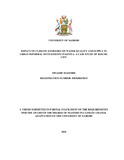| dc.description.abstract | The urban poor living in Kisumu City informal settlements are at particularly high risk from the impacts of climate extremes such drought, flooding and related water-borne diseases, in large part due to where they live, poor housing, and a poor waste management system. Access to water is obtained mainly through communal stand pipes, individual connections, tanks, or boreholes, rivers and springs. The risk of water contamination is high because of closely sited pit latrines, and is exacerbated by frequent flooding. The main objective of the research was to work with the communities to develop effective disaster risk reduction and climate change adaptation strategies to reduce the vulnerability of urban informal settlement dwellers to climate extremes that impact on their safe water supply. The data collection methods used included 333 household questionnaires analysed with SPSS software, identification and quantification of vulnerability, three focus group discussions with between 15 participants each, nine key informant interviews with local leaders, NGOs and government institutions, and time series analysis of climate trends from 1987- 2016. Results show an increasing trend of rainfall over Kisumu City. The trend also shows inter-annual variability of rainfall which showed increased or decreased patterns which resulted in drought and flooding. Majority (90%) of the respondents acknowledged that both flooding and drought impacted clean water supply, quality and use and 61% have to use alternative sources of water. The temperature trend over the same period showed the minimum temperatures rising faster than maximum temperature, which indicates warming. Majority of the respondents (83%) reported that flooding greatly impacted clean water supply because of pipe bursts which contaminated the water. Above half (62%) of the respondents also reported drought as a driver of water resource conflict especially among women who used water more frequently during dry-spells for household use. The respondents (62%) reported typhoid as the dominant health problem during dry-spells since they have to access to unsafe well water that had microbial contamination because of poor onsite sanitation. Almost all the respondents (97%) mentioned malaria as the most common disease related to flooding. The outcome of the study shows high vulnerability of Kisumu urban informal settlement dwellers to climate induced hazards such as drought and flooding which are accompanied by climate induced disease epidemics. The results show serious deficit in clean water supply and sanitation systems which pose some serious challenges like water contamination, poor solid waste management and contagious diseases. Climate extremes continue to pose severe impacts on water supply, rainfall and temperature as the projections still remain uncertain, and there is an urgent need for sound adaptation strategies to sustain water supply. There is need to invest in critical climate resilient water supply infrastructure. The county government needs to monitor climate change; rainfall, water utilities and water resources. An integrated water resource management should be in place which consists of various stakeholders. | en_US |



